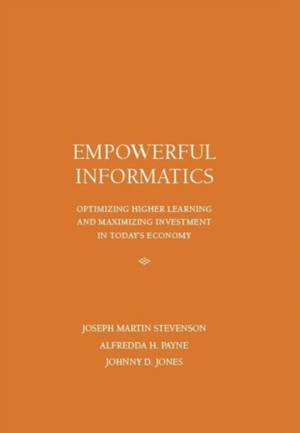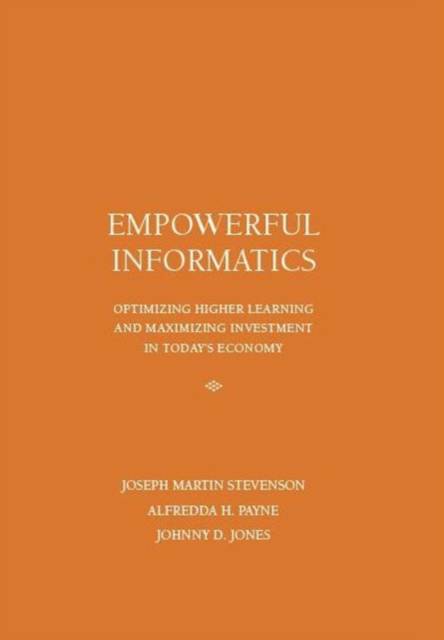
Bedankt voor het vertrouwen het afgelopen jaar! Om jou te bedanken bieden we GRATIS verzending (in België) aan op alles gedurende de hele maand januari.
- Afhalen na 1 uur in een winkel met voorraad
- In januari gratis thuislevering in België
- Ruim aanbod met 7 miljoen producten
Bedankt voor het vertrouwen het afgelopen jaar! Om jou te bedanken bieden we GRATIS verzending (in België) aan op alles gedurende de hele maand januari.
- Afhalen na 1 uur in een winkel met voorraad
- In januari gratis thuislevering in België
- Ruim aanbod met 7 miljoen producten
Zoeken
Empowerful Informatics
Optimizing Higher Learning and Maximizing Investment in Today's Economy
Joseph Martin Stevenson, Alfedda H Payne, Johnny D Jones
Paperback | Engels
€ 46,45
+ 92 punten
Omschrijving
How many times have you heard a potential college bound student say, Sure, I want to go to college, but right now, I have to make a living for myself and help my family? Or, I want to go to college, but I don t know what I want to study. On one hand, I love to read and write about literature; on the other, I also like doing physical things outdoors with my hands. Or, I learn better in smaller classes and I would feel lost in a large classroom setting. Or, I love to help people at my church with repairing things, but I also want beyond my church one day to learn more about different cultures around the world. This scholarly driven, yet practical, book is pointedly and purposefully titled, EMPOWERFUL INFORMATICS, to help students, parents, families, communities, and institutions of higher learning find the balance for personal empowerment, academic enlightenment, and economic efficiency. The authors have found that, too frequently, many families have misconceptions about the benefits of and the return on an investment in higher education. From the authors collective experiences, too often, families perceive higher learning based on inaccurate data, incomplete data, no data or information about options not far from their homes, neighbourhoods, and communities. The phases and points of progress for EMPOWERFUL INFORMATICS are discussed in this guidebook through the eight points of futuring, philosophy, anticipation, goal-setting, measurement, renewal, resource alignment, and human purpose/circling back over three phases. The book is quite timely, given the national conversations and movement concerning the cutting back and the curtailment of federal financial support for lower income students many of whom are first generation higher education seekers. This book is intended to reach the potential student as an idealist and the pragmatist, the dreamer and the doer, the farmer and the philosopher; and the scientist and the artist. As authors with over three decades of experience in adult, continuing, lifelong, higher, and other postsecondary education, we asked ourselves four fundamental questions in preparing and finishing this very timely book in today's unpredictable, uncertain, unsure, and chaotic global economy.
Specificaties
Betrokkenen
- Auteur(s):
- Uitgeverij:
Inhoud
- Aantal bladzijden:
- 110
- Taal:
- Engels
Eigenschappen
- Productcode (EAN):
- 9781680530032
- Verschijningsdatum:
- 17/03/2015
- Uitvoering:
- Paperback
- Formaat:
- Trade paperback (VS)
- Afmetingen:
- 152 mm x 226 mm
- Gewicht:
- 158 g

Alleen bij Standaard Boekhandel
+ 92 punten op je klantenkaart van Standaard Boekhandel
Beoordelingen
We publiceren alleen reviews die voldoen aan de voorwaarden voor reviews. Bekijk onze voorwaarden voor reviews.









